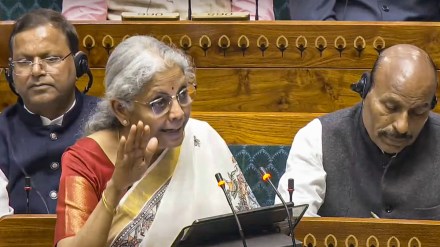The Union Budget for 2025-26 has outlined a forward-thinking vision for India’s space sector, with a significant financial commitment aimed at bolstering space exploration, satellite technology, and geospatial capabilities. The Department of Space has been allocated Rs 13,416.20 crore for the fiscal year, marking a notable increase over previous budgets and reinforcing the government’s commitment to growing India’s space ambitions.
Key Budget Allocations
In the current budget, Rs 6,103.63 crore has been earmarked for capital expenditure, while Rs 7,312.57 crore has been allocated for revenue expenditure. This reflects a focused effort on supporting both the infrastructure and operational needs of the space sector. When compared to the Rs 13,042.75 crore allocated during the interim Budget in 2024, the 2025-26 allocation shows a steady increase despite being slightly lower than the Rs 13,700 crore granted in FY23.
This rise in funding follows India’s impressive achievements in space technology, such as the successful Chandrayaan-3 lunar mission and the Aditya-L1 solar observation project, underscoring the nation’s growing space capabilities.
Industry Reactions to the Budget
The budget has been met with mixed but optimistic reactions from industry stakeholders, highlighting the government’s recognition of the critical role space technology plays in national development and its potential for future growth.
Dr Subba Rao Pavuluri, President of SIA-India, stressed the transformative impact of the government’s Rs 20,000 crore investment to drive private sector-led research and innovation. “This initiative, alongside the Deep Tech Fund, will spur the next wave of technological advancements, including in space technologies. The Centres of Excellence in AI will further position India as a leader in space research,” he remarked.
The government’s focus on AI, startups, and emerging technologies will undoubtedly benefit the space sector, especially through new funding mechanisms and support for startups. The creation of a Rs 1,000 crore venture capital fund specifically targeted at boosting private sector participation in the space industry is a critical step in encouraging innovation and fostering a competitive market for space technologies.
Expansion of Geospatial Infrastructure
One of the most significant moves in the 2025-26 budget is the launch of the National Geospatial Mission, aligned with the PM Gati Shakti initiative. This mission aims to develop spatial data to modernize land records, improve urban planning, and support infrastructure development through satellite technology.
According to Anil Prakash, Director General of SIA-India, “Satellite communications will play a crucial role in bridging the digital divide, particularly in underserved regions. The National Geospatial Mission will enhance India’s geospatial capabilities and make real-time satellite data more accessible for public and national development.”
Moreover, the budget’s strategic focus on the geospatial sector aligns with the industry’s forecast growth. As noted in a report by ISpA-Nasscom-Deloitte, the downstream space tech market is expected to reach approximately USD 610 billion by 2031, with satellite data playing a critical role in applications ranging from urban development to disaster management.
Support for Domestic Manufacturing
The budget also promises significant reforms to stimulate domestic manufacturing in the space sector. Beginning February 2025, the government will reduce the customs duty to zero on key components used in the installation of satellites and the building of launch vehicles. This move is seen as a crucial step in making the space sector more competitive and self-reliant, encouraging both domestic and international investment.
Goldie Dhama, Partner at Deloitte India, welcomed this measure, stating, “By removing customs duties on satellite and launch vehicle components, India is positioning itself as a global hub for space manufacturing. This policy will help foster a more competitive, innovation-driven space industry.”
Boosting Startups and MSMEs
In addition to these space-specific initiatives, the budget includes a broader push for startups and MSMEs, with new financial support mechanisms designed to encourage innovation in deep tech, including space technology. The Startup India Innovation Challenge, which offers grants to startups working in areas such as AI and space technology, will give emerging companies the resources they need to scale and compete globally.
The introduction of a New Fund of Funds and an enhanced Credit Guarantee Scheme for startups will provide further impetus to the space startup ecosystem, which remains in its early stages but holds significant promise for the future.
Lt Gen AK Bhatt, Director General of the Indian Space Association (ISpA), highlighted the importance of these initiatives: “The focus on skilling through Centres of Excellence and the establishment of new funding avenues for startups will be instrumental in developing a robust space ecosystem in India.”
Industry Leaders Weigh In
Industry leaders are particularly optimistic about the budget’s emphasis on integrating emerging technologies, such as AI and geospatial services, into the space sector. Krishanu Acharya, CEO of Suhora Technologies, highlighted the potential of the National Geospatial Mission, noting that it would help modernize land records and improve planning for infrastructure projects.
“The decision to grant the private sector access to critical data and maps from the PM GatiShakti initiative is path-breaking. It will transform the space sector and open up new market opportunities,” said Acharya, whose company is already working on geospatial technologies.
According to Awais Ahmed, Founder and CEO of Pixxel, “Introducing a Deep Tech Fund, Rs 20,000 crore investment in private sector-led R&D, an enhanced credit guarantee cover and expanded PLI schemes for semiconductors and high-tech industries will drive breakthroughs in emerging technologies.”
Adding, “The National Geospatial Mission and National Manufacturing Mission will bolster high-tech domestic production and reinforce India’s global leadership. Lower customs duty will further reduce input costs, deepen value addition, and enhance manufacturing and exports. This is arguably one of the most impactful developments for the private space industry since the space policy, providing a massive boost for Indian companies to compete globally. With these initiatives, the budget paves the way for greater private sector participation in high-impact industries, ensuring India’s pathway to leadership in the space sector in the years to come.”
